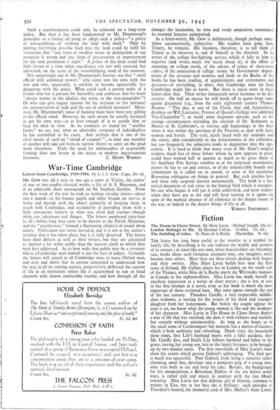War-Time Cambridge
Letters from Cambridge, 1939-1944. By A. S. F. Gow. (Cape. 10s. 6c1.) MR. Gow was till a year or two ago a tutor at Trinity, the author of one or two erudite classical works, a life of A. E. Housman, and of an admirable short monograph on Sir Stephen Gaselee. From the first week of the war he took to writing circular letters—about one-a month—to his former pupils and other friends on service at home and abroad, with the object primarily of keeping them in touch with Cambridge, and secondarily of providing them with a little extraneous interest in what was often dull routine—though often, too, adventure and danger. The letters numbered sixty-four in all ; before long they came to be known as the Parish Magazine, and the " parishioners " formed a fluctuating clientele of round about ninety. Publication was never intended, and it is not at the author's instance that it has taken place, but it is fully deserved. The letters have their defects as well as their virtues, but they are calculated to interest a far wider public than the narrow circle to which they were first addressed. As to how wide that public may be a reviewer who is a Cambridge man himself is not the best of judges. Certainly the letters will appeal to all Cambridge men, to many Oxford men, and over and above that to anyone concerned to understand how the war, in all its varying aspects, progressively deflected the current of life in an institution where life is accustomed to run in fixed channels with almost unalterable routine, and how through all the
changes the institution, by wise and ready adaptation, maintained its essential features unimpaired.
As a letter-writer, Mr. Gow is deliberately, though perhaps some- times unconsciously, subjective. His readers have gone, from Trinity, he remains. His business, therefore, is to tell them of Trinity as he observes it, and of himself as the observer. So he writes of the college fire-fighting service, which it falls to him to organise (and writes much too much about it), of the effect of rationing on college meals, of the advent of relays of short-term cadets, of the annexation of college rooms by Government depart- ments of the crocuses and aconites and birds in the Backs, of the books he has been reading, of appointments and retirements and deceases—of everything, in short, that Cambridge men far from Cambridge might like to know. But there is much more in these letters than that. Their writer fortunately never hesitates to be dis- cursive. On half an excuse he will break off to quote from some quaint document (e.g., from the early eighteenth century Thomas Hearne: "This day, at one of the Clock, that old, hypocritical, drunken sot Will Lancaster, Provost of Queen's College was admitted Vice-Chancellor "), or recall some forgotten episode, such as the strange circumstances attending the election of Dr. Robinson as Master of St. Catherine's, or various odd happenings in the days when it was within the province of the Proctors to deal with loose women and bawds. The style, nicely laced with the sardonic and the satiric, adds considerably to the attractiveness of the collection, but too frequently the subjective tends to degenerate into the ego- centric. It is hard to think that many even of Mr. Gow's original readers, much less of those before whom he now appears in print, could have wanted half or quarter as much as he gives them of his Auxiliary Fire Service troubles or of the perpetual examination papers he has to set and correct, or of the innumerable boards and committees he is called on to attend, or even of his occasional Bensonian soliloquies on things in general. But such patches here
and there only suspend interest momentarily. The book is a his- torical document of real value in the limited field which it occupies.
No one who begins it will put it aside unfinished, and most readers when they have got to the end will keep turning to it again—in spite of the marked absence of all reference to the deeper issues of the war, or indeed to the deeper things of life at all.
WARREN POSTBRIDGE.






























 Previous page
Previous page